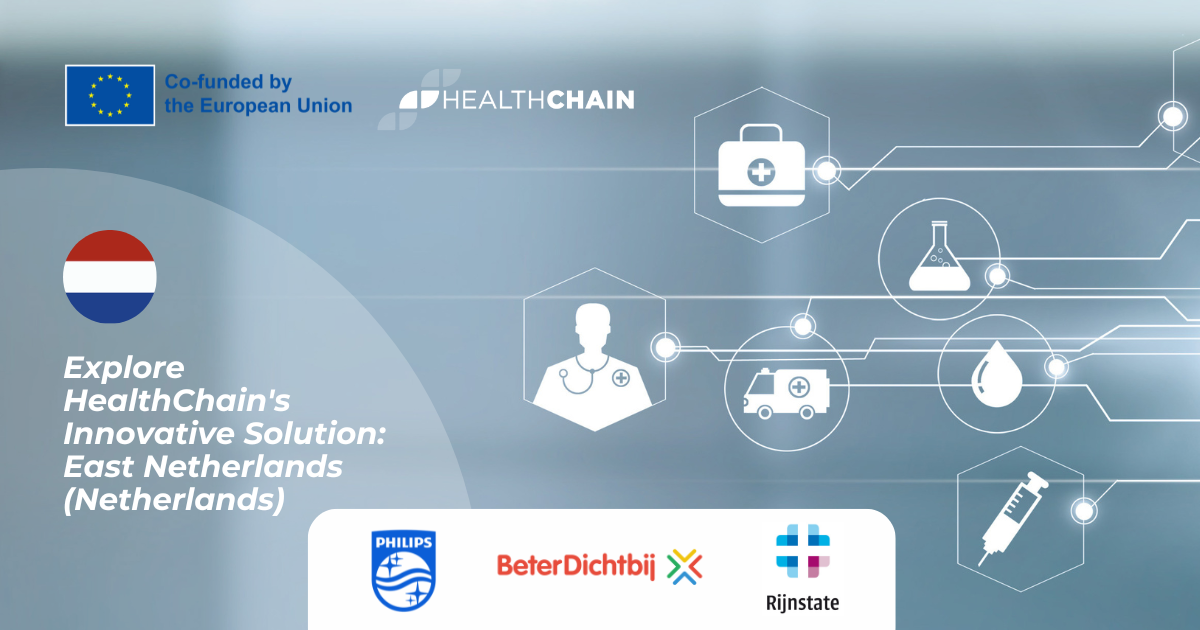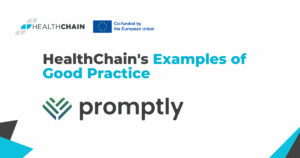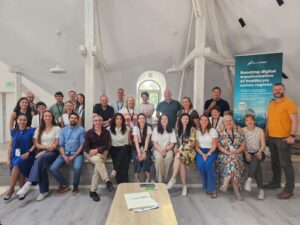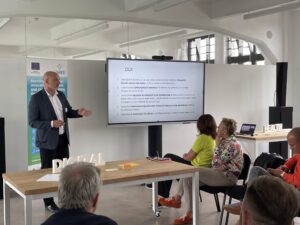To keep healthcare available and affordable in the future, we implement innovations and new digital applications on a daily basis. The need for further upscaling is great. Cooperation and knowledge sharing are crucial here. In Rijnstate, in the Netherlands, and throughout Europe. That is why Rijnstate is a partner in various (international) partnerships. HealthChain is such a partnership.
In the East Netherlands region, Rijnstate has the role of the challenger, while two IT companies have the role of the solver. These two companies are Philips and BeterDichtbij.
Rijnstate’s goal is to take accelerated steps to keep healthcare available and affordable in the future. To do so, we want to scale up home monitoring, promote patient self-management and improve cooperation with healthcare partners in the region. These are important topics we are focusing on within Rijnstate. HealthChain can contribute to this by tackling related challenges, in co-creation with companies and other healthcare partners.
Rijnstate will collaborate with Philips and BeterDichtbij to address identified challenge through the co-creation.
The challenge formulated by Rijnstate is to improve the efficiency of the Virtual Care Centre’s work processes and to improve collaboration between Rijnstate and the primary care sector. By doing so, Rijnstate aims to increase the quality of care and patient satisfaction and enable further upscaling of home monitoring.
The Virtual Care Centre monitors patients in their home situation using various systems. When deploying home monitoring for a new patient population, the care demand is first considered and then the right technology is chosen. The existing systems, such as Luscii Vitals and Mijn Rijnstate, are used as much as possible. If this does not match the care demand, then deviations are made. As a result, the Virtual Care Centre has to look in several systems to keep an overview of their patients and to know which patients need care. Notifications in these systems indicate that patients have exceeded thresholds of vital signs and questionnaires, which requires an action from the Virtual Care Centre. The Virtual Care Centre’s desire is to have an overview of all notifications from the various monitoring systems in order to set up the work process more efficiently. This contributes to scaling up home monitoring.
Philips has the Virtual Acute Care (VAC) system aimed at creating an overview from different acute care systems, such as the ICU. In the HealthChain project, VAC will be further developed together with Rijnstate into an overview of all notifications from the various monitoring systems. The first pilot will start with an overview of Luscii and Philips IntelliVue Guardian Solution. This will also require a link to the EPR. If successful, it will be extended to other monitoring systems.
To improve the home monitoring process even further, Rijnstate also aims to strengthen cooperation with primary care. This is because primary care plays an important role for patients who are monitored at home by the Virtual Care Centre, e.g. the home care provider giving IV antibiotics or the GP who also sees the patient during the patient’s overall care process. An important part of HealthChain is the information and communication needs of the care partners involved. BeterDichtbij supports this from their expertise in communication between healthcare organisations.
Author: Loes Habermehl, project leader Innovation & Care Transformation Rijnstate.
Disclaimer: The HealthChain project is funded by the European Union. Views and opinions expressed are however those of the author(s) only and do not necessarily reflect those of the European Union or European Innovation Council and SMEs Executive Agency (EISMEA). Neither the European Union nor the granting authority can be held responsible for them.








